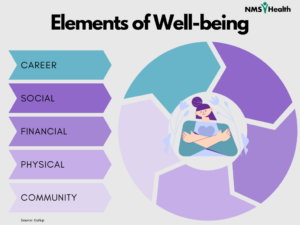In an era where employee well-being has gained significant attention, a recent survey conducted by Deloitte and Workplace Intelligence reveals a concerning disconnect between leaders and their workforce. While executives express a positive outlook on employee well-being, the reality paints a different picture. Employees say that stress at work is severely impacting their well-being, leading many to consider leaving their jobs. With more and more workers prioritizing well-being we might find that we are on the cusp of a workplace well-being revolution.
Understanding Well-being
According to Gallup, a renowned analytics and advisory company, well-being encompasses five universal elements that play a significant role in an individual’s thriving or struggling state. These elements are:
Career Well-being: Finding fulfillment in one’s daily work.
Social Well-being: Nurturing meaningful relationships and friendships.
Financial Well-being: Effectively managing personal finances.
Physical Well-being: Maintaining good health and energy levels.
Community Well-being: Feeling a sense of belonging in one’s living environment.
While all these dimensions contribute to overall well-being, career well-being emerges as the foundation upon which all the others are built. Employers who prioritize career well-being can make a substantial impact on their employees’ overall well-being in a shorter timeframe.
A Gap in Perception
According to the Deloitte survey, many employees continue to struggle with low levels of well-being, with the majority reporting worsened or stagnant health. Surprisingly, executives hold a contrasting belief, with over three-quarters inaccurately perceiving an improvement in their workforce’s well-being. Leaders appear to be disconnected from the well-being challenges faced by their employees which is discerning notion.
The survey also reveals a discrepancy regarding well-being commitments within organizations. While 84% of C-suite executives claimed their companies had made public well-being commitments, only 39% of employees agreed. This disconnect emphasizes the need for transparent communication and alignment of objectives between leadership and the workforce to foster a culture of well-being.
Workplace Well-being Revolution Obstacles
Despite employees’ strong motivation to achieve well-being, various obstacles hinder their progress. Heavy workloads, long hours, and stress emerge as the top barriers preventing employees from improving their mental and physical health. Taking time off and disconnecting from work remain significant challenges, with many employees reporting exhaustion and high levels of stress and illness. The survey also points out that work itself is a leading cause of burnout. This has been exacerbated by recent layoffs and increased workloads.
The Impact of Employer Care on Well-being
New research from Gallup reveals a significant correlation between employees’ perception of their employer’s care for their well-being and various positive outcomes. Employees who strongly believe that their employer values their overall well-being experience the following benefits:
- 3 times more likely to be engaged at work.
- 69% less likely to actively search for a new job.
- 71% less likely to report experiencing high levels of burnout.
- 5 times more likely to advocate for their company and trust its leadership.
- 36% more likely to thrive in their overall lives.
Moreover, teams that feel their organization cares about their well-being demonstrate higher customer engagement, profitability, productivity, lower turnover rates, and fewer safety incidents.
“Our understanding of what it means to create and sustain value is shifting,” said Paul Silverglate, U.S. Executive Accelerators leader and Deloitte LLP’s technology sector vice chair. “We’re beginning to see how economic value is fundamentally intertwined with employee well-being and quality of life, and that’s why human sustainability should be at the top of every corporate agenda.”
Addressing the Obstacles
Managers play a pivotal role in supporting employee well-being as they directly interact with their teams on a daily basis. However, the Deloitte survey reveals that managers face their own challenges in providing adequate support. The survey indicates that 70% of managers face obstacles such as rigid company policies and an unsupportive workplace culture, preventing them from adequately supporting their team members.
To address this, companies must equip managers with the right tools and empower them to prioritize employee well-being. Moreover, organizations need to embrace the concept of “human sustainability” by fostering employee development, incorporating regular wellness testing and benefits, implementing equitable practices, and exploring innovative approaches such as four-day work weeks. “Organizations that are embracing this concept are helping their employees become healthier, more skilled, and more connected to a sense of purpose and belonging,” a Deloitte article explains.
Encouragingly, top leaders are recognizing the need for change. As many as 78% believe that company leaders should step down if they cannot maintain an acceptable level of workforce well-being. Additionally, 72% feel that executive bonuses should be tied to well-being metrics.
The Future of the Workplace Well-being Revolution
The survey’s findings underscore the importance of accountability and transparency in the pursuit of workplace well-being. As the well-being revolution gains momentum, the demand for transparent reporting on employee wellness is increasing. Both executives and employees recognize the importance of standardized metrics and the accountability they bring. By embracing wellness testing and public well-being reports, companies can showcase their commitment to employee welfare, foster a culture of well-being, and create a workplace where employees thrive.
“Organizations have much to gain from metrics that can help them better understand and communicate about worker well-being,” added Jen Fisher, Deloitte’s U.S. chief well-being officer. “The majority of the leaders surveyed agree that sharing this information could build employee trust and help them attract talent. And while publicly disclosing these metrics may seem radical, it has a precedent with the evolution of environmental, social and governance (ESG) reporting.”



